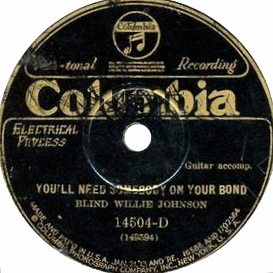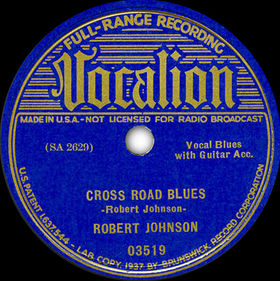Related Research Articles

Blind Willie McTell was a Piedmont blues and ragtime singer and guitarist. He played with a fluid, syncopated fingerstyle guitar technique, common among many exponents of Piedmont blues. Unlike his contemporaries, he came to use twelve-string guitars exclusively. McTell was also an adept slide guitarist, unusual among ragtime bluesmen. His vocal style, a smooth and often laid-back tenor, differed greatly from many of the harsher voices of Delta bluesmen such as Charley Patton. McTell performed in various musical styles, including blues, ragtime, religious music and hokum.

Robert Leroy Johnson was an American blues musician and songwriter. His landmark recordings in 1936 and 1937 display a combination of singing, guitar skills, and songwriting talent that has influenced later generations of musicians. Although his recording career spanned only seven months, he is recognized as a master of the blues, particularly the Delta blues style, and as one of the most influential musicians of the 20th century. The Rock and Roll Hall of Fame describes him as perhaps "the first ever rock star".

461 Ocean Boulevard is the second solo studio album by English musician Eric Clapton. It was released in late July 1974 by RSO Records, after the record company released the hit single "I Shot the Sheriff" earlier in the month. The album topped various international charts and sold more than two million copies.

Blind Willie Johnson was an American gospel blues singer, guitarist and evangelist. His landmark recordings completed between 1927 and 1930—thirty songs in total—display a combination of powerful "chest voice" singing, slide guitar skills, and originality that has influenced generations of musicians. Even though Johnson's records sold well, as a street performer and preacher, he had little wealth in his lifetime. His life was poorly documented, but over time, music historians such as Samuel Charters have uncovered more about Johnson and his five recording sessions.

Robert Hicks, known by the stage name Barbecue Bob, was an early American Piedmont blues musician. His nickname was derived from his working as a cook in a barbecue restaurant. One of the three extant photographs of him show him playing a guitar and wearing a full-length white apron and cook's hat.

Delaney & Bonnie was an American duo of singer-songwriters Delaney Bramlett and Bonnie Bramlett. In 1969 and 1970, they fronted a rock/soul ensemble, Delaney & Bonnie and Friends, whose members at different times included Duane Allman, Gregg Allman, Eric Clapton, George Harrison, Leon Russell, Bobby Whitlock, Dave Mason, Steve Howe, Rita Coolidge, and King Curtis.

"You'll Need Somebody on Your Bond" is a gospel song that is attributed to both tradition and to gospel blues musician Blind Willie Johnson. Johnson first recorded the song in December 1930, although Delta blues musician Charley Patton recorded a similar "You're Gonna Need Somebody When You Die" in October 1929. Over the years, several other musicians have recorded renditions of the song.

"In My Time of Dying" is a gospel music song by Blind Willie Johnson. The title line, closing each stanza of the song, refers to a deathbed and was inspired by a passage in the Bible from Psalms 41:3 "The Lord will strengthen him upon the bed of languishing, thou wilt make all his bed in his sickness". Numerous artists have recorded variations, including Bob Dylan and Led Zeppelin.

"Cross Road Blues" is a song written by the American blues artist Robert Johnson. He performed it solo with his vocal and acoustic slide guitar in the Delta blues style. The song has become part of the Robert Johnson mythology as referring to the place where he sold his soul to the Devil in exchange for musical genius. This is based largely on folklore of the American South that identifies a crossroads as the site where Faustian bargains can be made, as the lyrics do not contain any references to Satan.

The Cream of Clapton is an Eric Clapton compilation album released in 1995. Additionally, the European and U.S.-versions have a different track listings. The European version had already been released as The Best of Eric Clapton in 1991, though without the track "I Can't Stand It".
"Motherless Child Blues" is the name of two distinct traditional blues songs. They are different melodically and lyrically. One was first popularized by Robert "Barbecue Bob" Hicks, the other by Elvie Thomas.

"It's Nobody's Fault but Mine" or "Nobody's Fault but Mine" is a song first recorded by gospel blues artist Blind Willie Johnson in 1927. It is a solo performance with Johnson singing and playing slide guitar. The song has been interpreted and recorded by numerous musicians in a variety of styles, including Led Zeppelin on their 1976 album Presence.

"Dark Was the Night, Cold Was the Ground" is a gospel blues song written and performed by American musician Blind Willie Johnson and recorded in 1927. The song is primarily an instrumental featuring Johnson's self-taught bottleneck slide guitar and picking style accompanied by his vocalizations of humming and moaning. It has the distinction of being one of 27 samples of music included on the Voyager Golden Record, launched into space in 1977 to represent the diversity of life on Earth. The song has been highly praised and covered by numerous musicians and is featured on the soundtracks of several films.

"Willie and the Hand Jive" is a song written by Johnny Otis and originally released as a single in 1958 by Otis, reaching #9 on the Billboard Hot 100 chart and #5 on the Billboard R&B chart. The song has a Bo Diddley beat and was partly inspired by the music sung by a chain gang Otis heard while he was touring. The lyrics are about a man who became famous for doing a dance with his hands, but the song has been accused of glorifying masturbation, though Otis always denied it. It has since been covered by numerous artists, including The Crickets, The Strangeloves, Eric Clapton, Cliff Richard, Kim Carnes, George Thorogood, The Bunch, and in live performances by The Grateful Dead. Clapton's 1974 version was released as a single and reached the Billboard Hot 100, peaking at No. 26. Thorogood's 1985 version reached No. 25 on the Billboard Rock Tracks chart.

The Soul of a Man is an album of "twenty haunting spiritual blues songs" recorded in the late 1920s and 1930 by the American gospel blues singer and guitarist Blind Willie Johnson that was released by Charly Records in 2003.
"(I Know) His Blood CanMake Me Whole" is a traditional gospel blues song recorded by Blind Willie Johnson in 1927. It was released on his first single, with the flip side "Jesus Make Up My Dying Bed".

"When the War Was On" is a call and response blues song recorded in 1929 by Blind Willie Johnson and Willis B. Harris, who is thought to have been his first wife. Johnson plays bottleneck guitar, and sings throughout in his "growl" voice; Harris sings soprano.

The Complete Blind Willie Johnson is a compilation album of all the known recordings by American gospel blues singer-guitarist Blind Willie Johnson. As part of the Roots N' Blues series, it was released jointly by Columbia Records and Legacy Recordings, on April 27, 1993. All of the tracks on the two-compact disc set were originally issued by Columbia on the then-standard two-sided 78 rpm record format.

American Epic: The Best of Blind Willie Johnson is a compilation album released to accompany the award-winning American Epic documentary film series. It collects performances from Blind Willie Johnson's five recording sessions for Columbia Records in Dallas, Atlanta, and New Orleans between 1927 and 1930. The album was released as a 16-track download and a vinyl LP.
References
- ↑ BMI currently lists "Mother's Children Have a Hard Time" as BMI Work #6763772 and "Johnson Willie" as the songwriter/composer. "Mother's Children Have a Hard Time". BMI . Retrieved March 31, 2019.
- 1 2 Layne, Joslyn. "Blind Willie Johnson – Biography". AllMusic . Retrieved August 27, 2011.
- ↑ Charters 1993, pp. 17–18.
- ↑ Charters 1993, p. 18.
- ↑ Charters 1993, p. 17.
- ↑ 1,000 Recordings to Hear Before You die. Workman Publishing Company. August 28, 2008. ISBN 978-0-7611-5385-6.
- ↑ "Eric Clapton - 461 Ocean Boulevard Album Reviews, Songs & More". AllMusic .